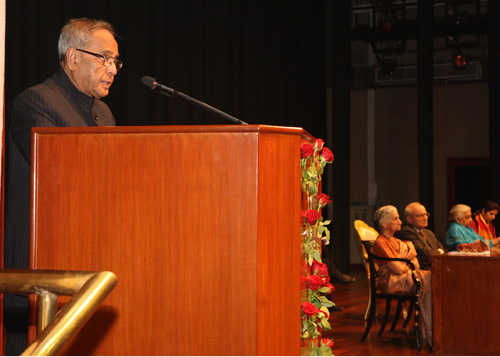
I am delighted to be inaugurating the Silver Jubilee celebrations of the Indira Gandhi National Centre for the Arts (IGNCA), established 25 years ago in the memory of Mrs. Indira Gandhi. The Centre seeks to fulfil her dream and vision for India as a strong nation where civilizational values, dignity of life, respect for nature and development go hand in hand.
The arts and all their manifestations were dear to Mrs.Gandhi. She said and I quote, "We know that India is what she is because art was alive here as a part of the very life of the people"(unquote). She further stated that there, indeed, can be no civilization without music, dance and arts; for one is not fully, vibrantly alive without them. But she also envisaged heritage as something to be not merely admired and drawn upon but also to be studied in depth as a means of gaining a fuller understanding of societies and their cultural constructs.
The IGNCA was, accordingly, established as a Centre that would encompass the study of all forms of art in all their dimensions. The Centre was inaugurated by late Shri Rajiv Gandhi, the then Prime Minister of India, who emphasised that (quote), "the Centre has tremendous challenges...It has to use the most modern technology to protect and preserve the ancient" (unquote). He was also the founder trustee of the IGNCA along with other eminent personalities like Shri R. Venkatraman, Shri P.V. Narasimha Rao and Shri H.Y. Sharada Prasad.
The conceptual framework of the Centre, thus, took in its ambit all the diverse forms of arts and endeavoured to study them through a holistic and multi-disciplinary approach. It challenged the prevailing binary approaches which separated the traditional from the modern, oral from the written, urban from the rural, and folk from the classical. Given the times, it was a paradigm shift in the existing epistemological models in the study of art and culture. The Centre has been looking at the fundamental concepts of Indian thought and culture as articulated in the textual traditions and bringing out lexicons and glossaries of these concepts. It has compiled, edited and translated some of the more significant texts on Indian arts and aesthetics. Living traditions, region- and community-specific studies, lifestyles and cultural expressions of small-scale societies, their wisdom, traditions, arts and crafts and belief systems have been studied and documented with a view to link them to issues of cultural identity, education, conflict resolution and sustainable development.
IGNCA is also providing a creative platform for fostering dialogue between the arts and current ideas in philosophy, science and technology to bridge the gap in the understanding between modern sciences and arts and culture. Some of the brightest minds from diverse fields have, over time, been associated with the work of the IGNCA. The Centre has also launched major programmes on South- East Asia, East Asia and Eurasia and collaborated with several institutions and state libraries around the world to bring together scattered manuscripts, slides, photographs etc.
I would like to recall here Mrs. Indira Gandhi's words when she said (quote), "If you wish to know something about India, you must empty your mind of all preconceived notions of what you have heard or read. India is different and exasperating.... You will not find any of your formal labels useful. India is many and it is one; it has incredible diversity yet it is bound in unity that stretches way back into unwritten history"(unquote). IGNCA, carrying forward that thought process, has been the forbearer of many new initiatives. The Centre was the first to use modern day information technology to document, preserve and revitalize culture and cultural studies. It has held theme-based exhibitions on Space, Time, Aakaar, Prakriti, Ritu-ritam and several others. Its publications on fundamental texts and concepts of Indian thought reflect the Centre's endeavour to develop new approaches so necessary for developing a more meaningful understanding of Indian culture.
Today, as India stands at the threshold of substantive economic progress and scientific development, the role of culture as a balancing factor between progress and the inner needs of an individual; between his spiritual quest and material aspirations; between technological advancement and the need to maintain ecological parity cannot be over-emphasised. The role of institutions such as IGNCA becomes more significant in this context. Institutions like IGNCA constantly need to discover and re-invent new ways of establishing a creative and meaningful dialogue between different stakeholders and adding cultural dimensions to the development debate.
Recognising the stellar contribution of IGNCA over the years, I am happy to note that the President's Secretariat is presently collaborating with IGNCA for undertaking a multi-volume project on various aspects of Rashtrapati Bhavan's archaeological history, its making, its art and cultural artefacts. I wish the project all success.
I also wish IGNCA the very best in its academic pursuits and hope that its network with the universities and institutions, both in India and abroad, would grow further. I am confident that IGNCA, under the able guidance of its Trust, would continue forward on its journey of excellence.
